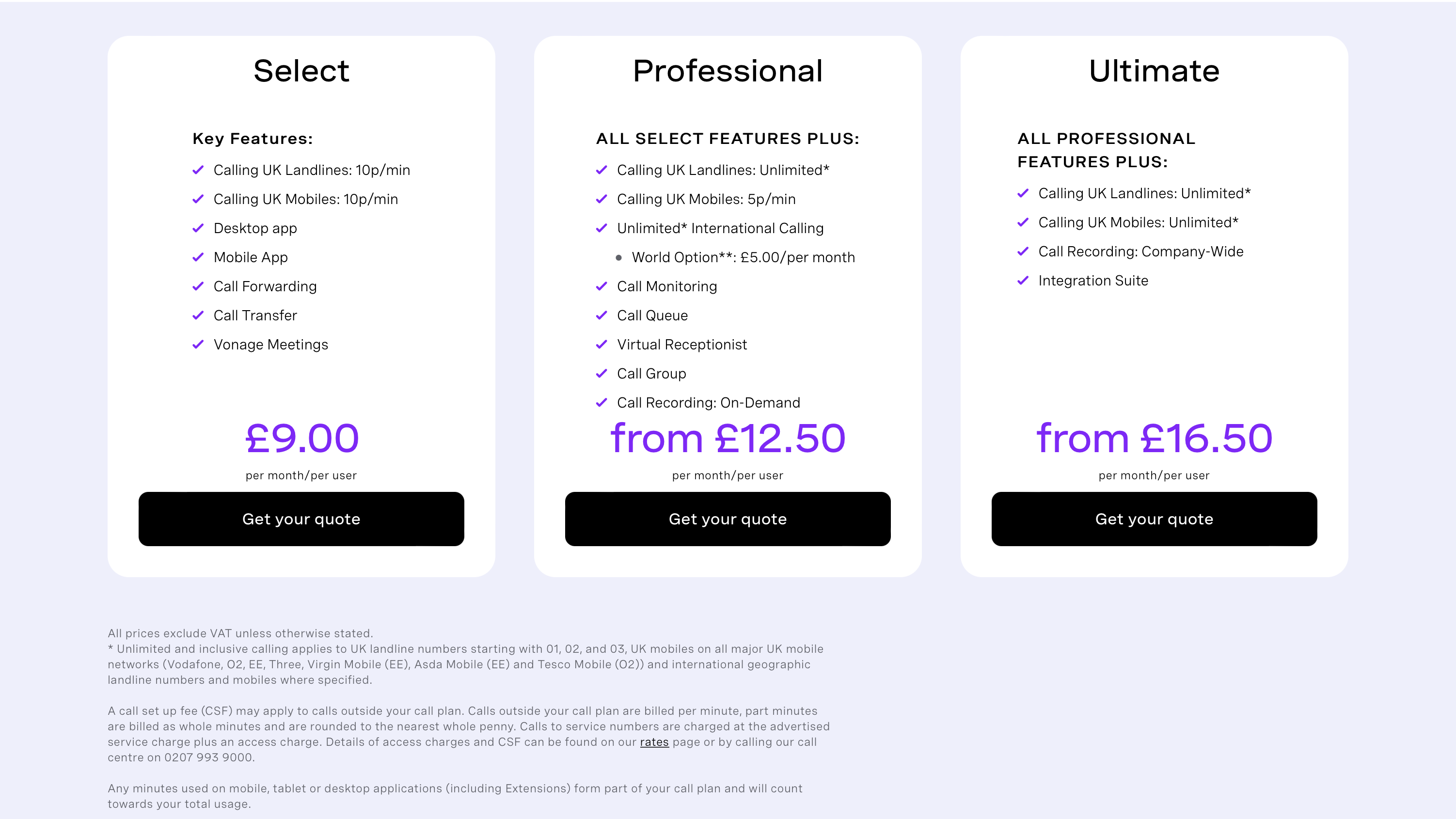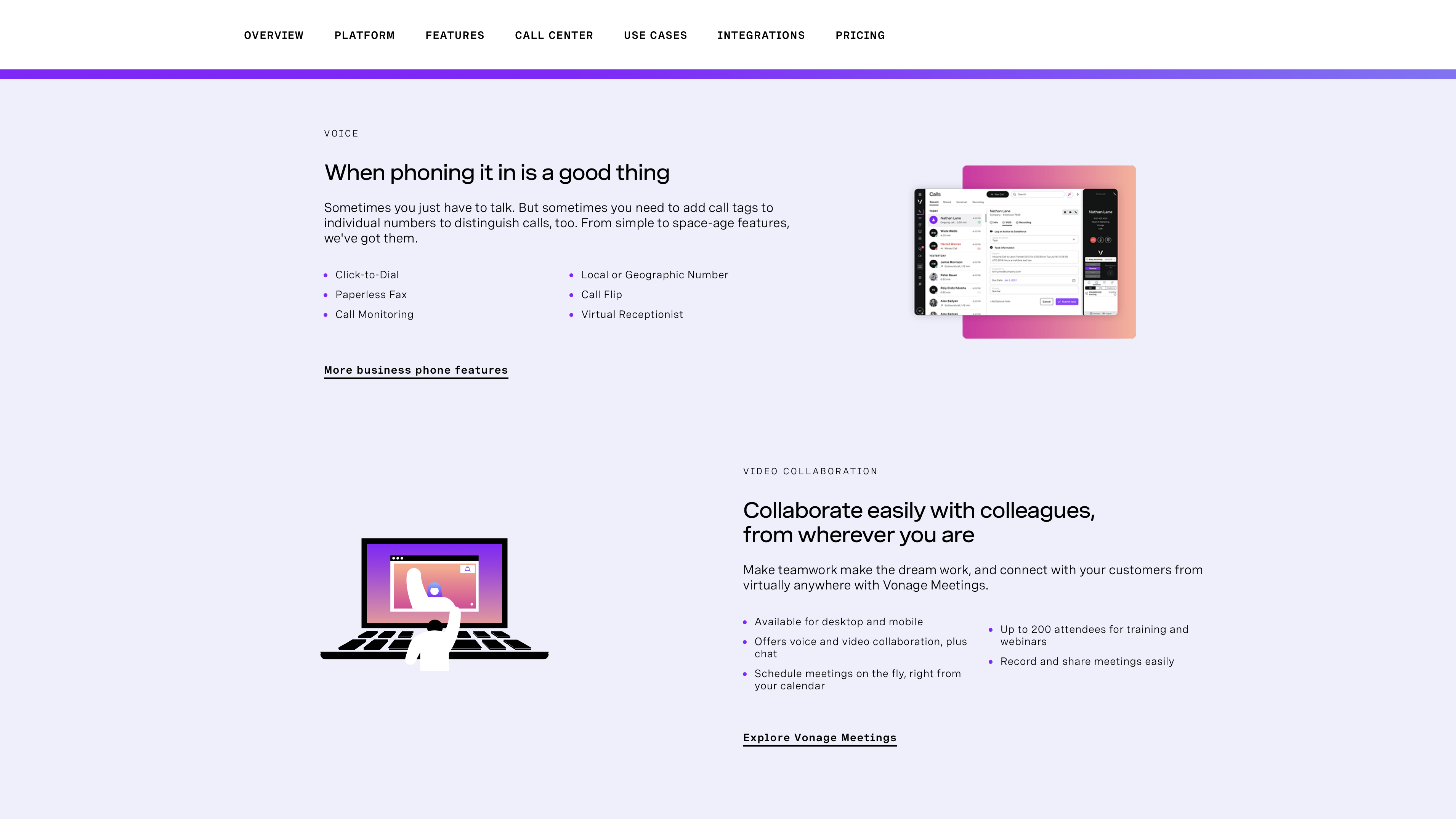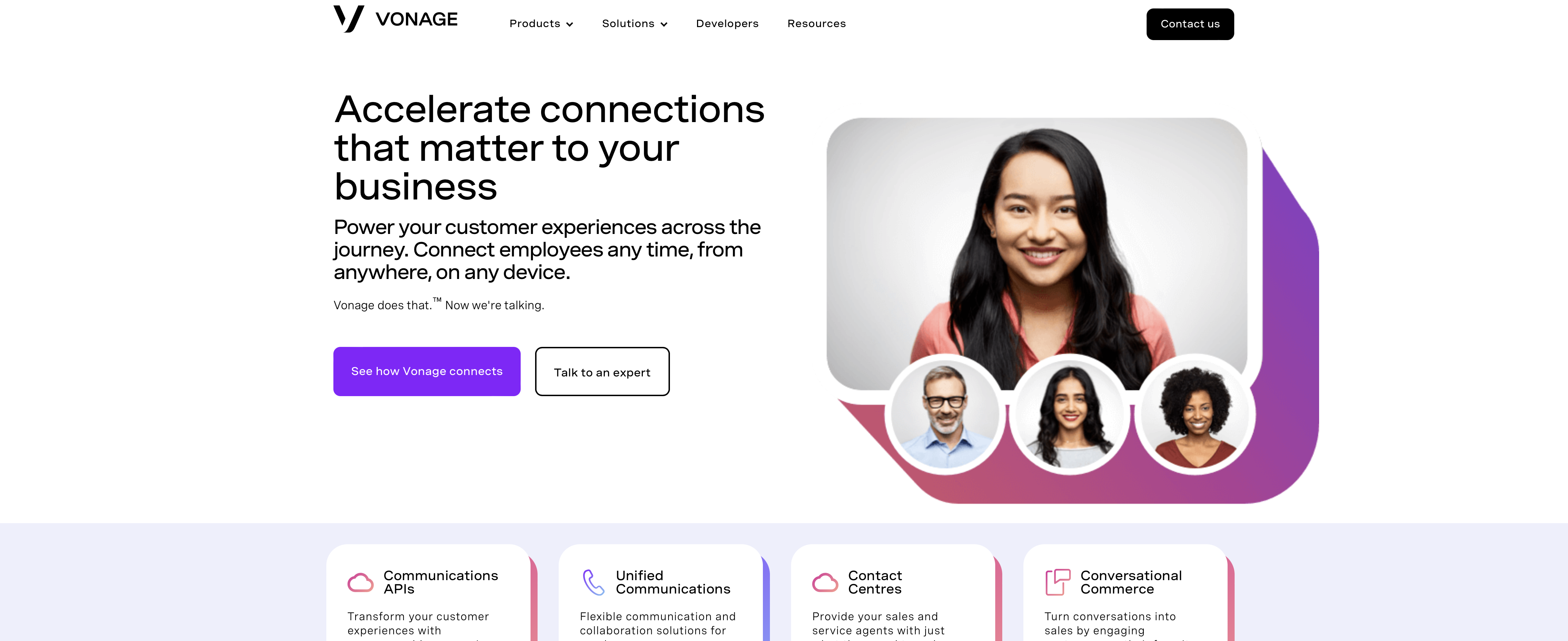TechRadar Verdict
Vonage Business Cloud is perfectly pitched at enterprises with legacy systems and deep pockets, but doesn't really offer much for small businesses. Competitors offer more features for less money, and provide innovative additions (such as customizations) as well.
Pros
- +
Price scaling by number of lines
- +
Decent features with advanced plans
- +
Established brand
Cons
- -
Basic plan too limited
- -
Competitors can offer so much more
Why you can trust TechRadar
Not too long ago, Vonage was pretty much a household name. But with landlines out of fashion and most of us using our cell phones at home, the company has invested in its Business Cloud Voice over Internet Protocol (VoIP) service. And though you have to pay extra for basic features like video conferencing, chat, and file sharing, there are price scales on the number of lines you'll be using, which should appeal to enterprises with legacy phone systems.
Unlike some of the other players in the VoIP market, Vonage Business Cloud requires no annual contract, and even its lowest price tier offers unlimited texting and calling. But if you’re running a small business that needs only one to four lines, the price per month per user is going to be higher than if you run a business with 20 to 99 employees. And younger and more dynamic competitors really can offer more for less money. However, if you want to stick with the tried-and-tested Vonage brand, then the Vonage for Home solution does represent an excellent choice for SMBs.
Firms are left with a decision to make: Although Vonage does have plenty of features (and integrations), and can scale up wonderfully with your business, you’ll have to determine whether you think it represents a good value for your money based on the current size of your business.
Vonage Business Cloud is certainly not a bad option for any business that is looking to invest in a new VoIP solution but with competition in this market so fierce, there are alternatives that are more affordable.
- Best cloud phone systems: buy a business PBX system in the cloud
- Best business phone services
- The best VoIP phones for the small business and home office
- We've also highlighted the best VoIP providers

Vonage Business Cloud: plans and pricing
We previously complained about Vonage’s pricing structure which skewed heavily depending on how many employees you wish to grant access to VoIP. While this isn’t uncommon, smaller businesses would often end up paying more for the same service, simply because they had fewer employees.
Happily, Vonage has given its subscription model a shake-up, allowing pricing to be more consistent. The entry-level Select plan gets call forwarding and transferring, as well as desktop and mobile app access, but no included calls. It costs from £9 per user per month, and from is the operative word here. What’s not so clear on Vonage’s website is that this requires a 36-month contract. When we challenged this, we were told that a more accurate quote could be generated with potential savings in place for larger organizations. It’s a shame about the lack of transparency on the company’s website about this.
Call monitoring, call queue, call grouping and a virtual receptionist all form part of the Professional package, which we think makes more sense for most businesses. It also gets unlimited domestic calling and some international calling, too, for as little as £12.50 per user per month. The headline figure, at least, is fairly competitive given the features on offer.
Ultimate plans allow users to call mobile numbers for free, too. This, and the option for some pretty handy integrations, costs from £16.50 per user per month.
Pricing in dollars is a little more expensive like-for-like, at $19.99, $29.99, and $39.99 for each plan. This isn’t the first time we’ve seen such a discrepancy between currencies, and it’s far from the largest, too.
Vonage Business Cloud: features

For the most part, the functionality you get when you sign up for Vonage Business Cloud is par for the course. The difference between it and, say, RingCentral MVP , is that RingCentral gives you a lot more at the base level.
Assuming you want just one to four lines, the Vonage Business Cloud Mobile plan is – in Vonage’s own words – great for “any team that doesn’t need desk phones.” It offers unlimited calling and texting, a desktop app, a mobile app, and VonageFlow, or Vonage’s team messaging service.
Altogether, Vonage offers more than 50 voice and unified communication features, including video collaboration with Vonage Meetings and a host of productivity tools, which are accessible through the Vonage App Centre. These features run the gambit of all those you’d expect from a VoIP system - call forwarding, voicemail to email, call logs, and many more.
To improve the customer and employee experience, Vonage also comes with a Call Announce feature that delivers an audible version of a custom tag to the receiver before the call is connected. The feature can be used in conjunction with Call Screening and the Screening Menu, giving you the option to answer the call, send it to voicemail, or transfer it somewhere else. Primarily, it means that your employees can be fully prepared before they pick up their handset. Call recording features, either on-demand or company-wide, also mean that businesses never have to worry about forgetting information from an important call. And a password-protected archive allows this information to be stored for as long as you need it.
The good news is that Vonage Business Cloud comes with all the features that you could ever need from a VoIP system. The bad news is, if you want access to more than just the basic features, you’ll have to pay a premium price for the privilege. The platform does come with documentation and example code to help with the implementation of specific functions, however, which will be welcomed by businesses that want to delve a little deeper into the coding that underpins some of Vonage’s VoIP features.
Integrations

One of Vonage’s most vaunted characteristics is the way that it allows seamless integration with several third-party applications. By connecting with organizations’ existing CRM tools, Vonage Business Cloud can empower collaboration, boost productivity, and enhance customer experiences - all from one unified platform.
This integration means businesses gain easy accessibility from any browser or device, can sync all call data into their business application’s native reporting dashboards, and can embed UI-level integrations to eliminate toggling between apps.
One of the biggest shifts in workplace collaboration in living memory has been the growth of video conference tools in response to the COVID-19 pandemic and the home working policies that many firms were forced to adopt. This has meant solutions like Microsoft Teams, Google Meet, Zoom, and others witnessing a huge rise in popularity.
VoIP solutions that can integrate with some of these video conferencing tools are understandably proving attractive to many businesses - and this is another area where Vonage Business Cloud shines. The platform comes with Microsoft Teams integration, which allows companies to access PBX features with optimized and superior call quality from within the Microsoft Teams interface. Rather than having to switch between platforms, businesses that use Teams can enjoy enterprise-grade collaboration integrated into a single application.
Another noteworthy integration is Vonage for Salesforce. This enables employees to view caller information and Salesforce records simultaneously and create relevant Salesforce activities from within a single interface. Vonage for Salesforce can be accessed either through an embedded Salesforce interface or a web browser. Salesforce integration enables Vonage users to capture data across a multitude of devices, streamline workflows, and gain real-time insight, without any client-side installation required.
Despite being able to trace its roots back more than two decades and its decrease in popularity due to an increase in competition, Vonage is still committed to keeping its services up-to-date and that extends to the integrations on offer. These are only set to get better over time as the company looks to partner up with more service providers.
Teams and Meet integrations, for example, have evolved into support for the entire Office 365 and Google Workforce suites, and Slack support has also been added.

Final verdict
Compared to other cloud-based VoIP services, Vonage Business Cloud under-delivers on a number of fronts for people just kicking off a new business or running one with just a handful of employees. When compared to its competitors, it's difficult to see what could really appeal here to SMBs. Vonage aims its service at enterprises that would like to touch on cloud services while still being reliant on landlines. In that regard, Vonage can deliver and will scale with your business, although it’s likely that its competitors can deliver more.
Despite the negatives, Vonage does offer a lot of features and can obviously cater for its target market. But if you're a new or small business, and you're looking to fully embrace digital transformation when it comes to cloud-based phone systems, you're probably better off looking to more innovative competitors such as RingCentral, Dialpad, or GoToConnect.
- Best cloud phone systems: buy a business PBX system in the cloud
- Best business phone services
- The best VoIP phones for the small business and home office

